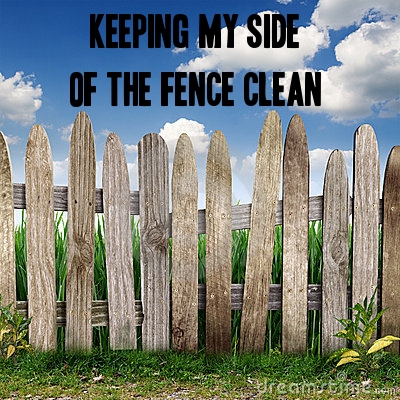Shit happens and sometimes shit even hits the fan. Sometimes it happens when you least expect it...you are going along minding your own business, doing your thing and working hard to lead a peaceful life, when BAM! you are all of a sudden smacked upside the head. Shit just hit the fan. It's in moments like this where we are faced with a choice, a decision on how to respond and how to react.
My personal motto lately has been "To keep my side of the fence clean." That's really my main job anyway isn't it? I need to worry about myself and what I am bringing to the table, how I am acting and reacting. I feel it's my job to teach my kids to keep their side of the fence clean too. What someone else does or doesn't do is really none of our concern. As photographer and author Edward Weston observed in his Daybooks, "A lifetime can well be spent correcting and improving one's own faults without bothering about others."
Maybe my job is to understand whether I play a role in it, whether there's a lesson for me to learn, maybe to exercise empathy, compassion and if needed forgiveness. The rest, well it's probably none of my business.
There's a key question that my friend, Haywood Simmons, frequently mentions that you can ask yourself when it comes to any conversation, but especially when reacting to conflict. Even if you aren't part of the challenge, but listening to another person's frustration, ask yourself, "Does it improve the silence?" If I am going to say something right now, will it improve the silence? In other words, will it bring something positive to the conversation or will it be feeding the negativity? A friend of mine said, "We are given two ears and one mouth for a reason." If it doesn't improve the silence, don't say anything at all.
Keeping my side of the fence clean also applies to the challenge of the ego. We've all heard of the old adage...the grass is always greener on the other side of the fence. This refers to the way we tend to look at other people’s lives and other things that we don't have through rose colored glasses. It comes from the idea of looking at a neighbor's lawn and seeing it as looking better than your own, when in reality you’re just ignoring anything negative about it and downplaying everything positive about your own. It's about coveting, about being envious. Keep my side of the fence clean, don't bother with what's on the other side of the fence. Chances are the grass isn't really any greener.
Gretchen Rubin posted a piece on her website titled, 7 Tips for Minding My Own Business, that I would like to share with you. Her motto is to "Mind my own business." To do this, she reminds herself of the following:
1. No one asked for my advice. Except in the rare instance when people specifically ask me for help clearing their clutter, raising their children, or deciding their careers, I should keep my advice to myself.
2. I don’t know the whole story. It’s very easy to assume that I understand a situation and to form a judgment when in fact, I understand almost nothing about what’s happening.
3. I only see things from my own perspective.
4. Just because something makes me happy doesn’t mean that it will make someone else happy, and vice versa. I often fight the impulse to be a happiness bully, but what works for me might not work for someone else. It's probably better to encourage people to trust themselves and to listen to their own inner guidance system.
5. Don't Gossip.
6. I’m on someone else’s turf. I’m puzzled by my mother-in-law’s habit of keeping her toaster unplugged. Why — why keep the toaster unplugged? Whenever I want to challenge her to defend her unplugged-toaster position, I remind myself, “This is her apartment and her rule. Unplug the toaster.” (I have to confess, I usually forget to unplug it. But I mean to unplug it.)
7. Find explanations in empathy.
How about you? Do you struggle to mind your own business, or to keep your side of the fence clean? What are some other ways of trying to keep your side of the fence clean? I would love to hear your thoughts!

 RSS Feed
RSS Feed
